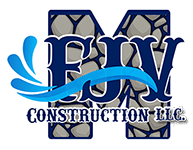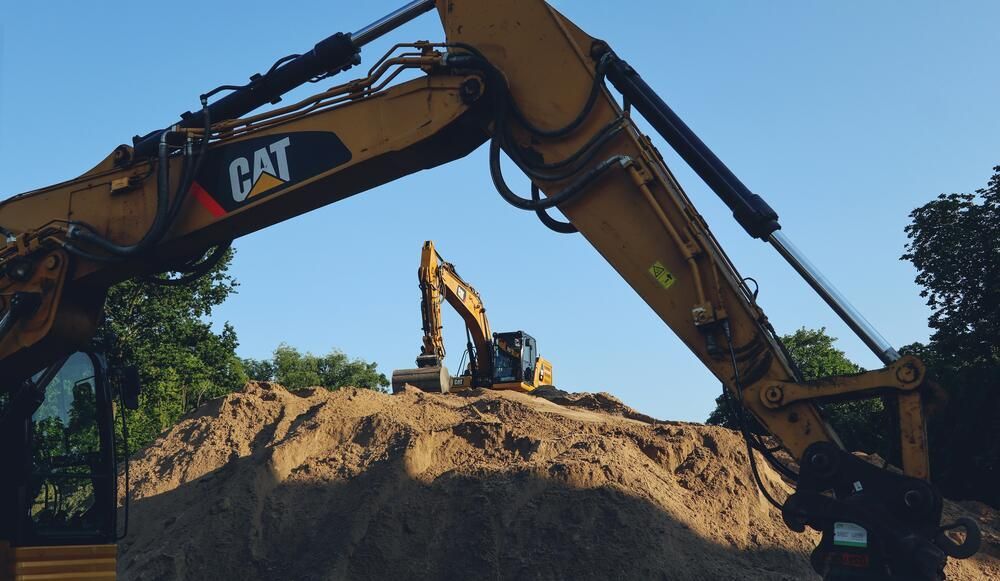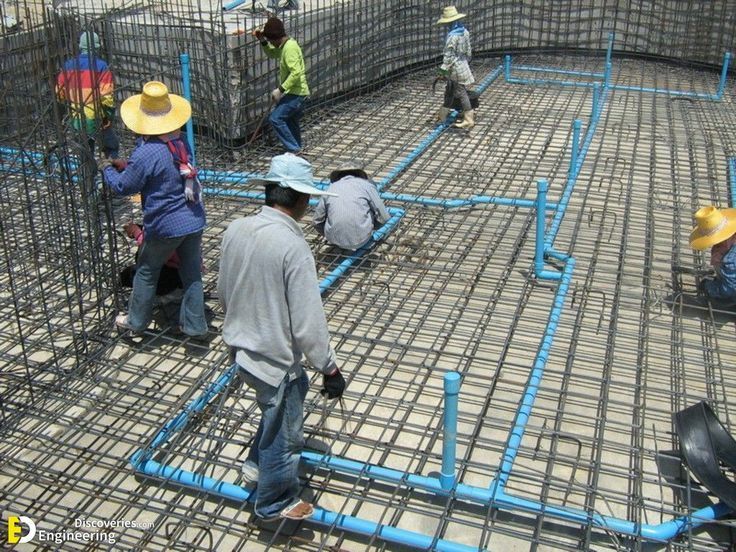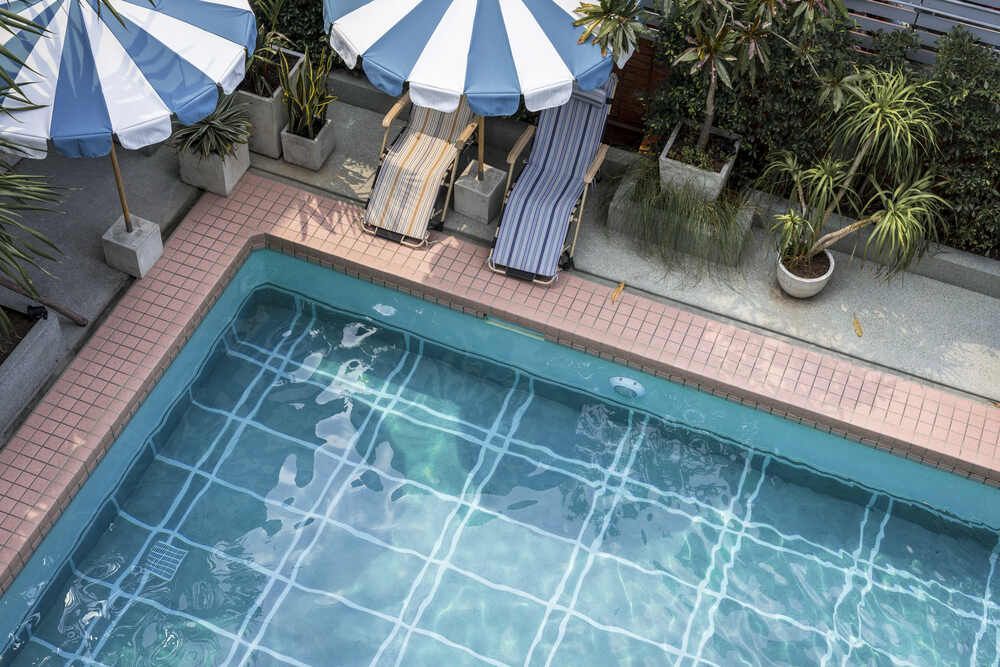7 Essential Pool Safety Tips from Expert Pool Contractors Near You
Childproofing a swimming pool is a critical task every parent and homeowner should take seriously. With the alarming statistics of pool-related accidents involving children, it's essential to contact expert pool contractors in Bethel, CT, for guidance. To help you curb these risks, we'll explore seven valuable tips from seasoned pool contractors, focusing on how to make your swimming pool a safe environment for your children.
Table of Contents
Introduction
Key Takeaways
- Establishing Physical Barriers
- Supervision Strategies
- Alarm Systems and Safety Equipment
- Water Quality and Hygiene
- Emergency Preparedness
- Poolside Environment and Layout
- Regular Maintenance and Inspections
Frequently Asked Questions (FAQs)
Key Takeaways:
✓ Installing robust fencing and secure pool covers is crucial to prevent unsupervised access and accidental falls into the pool.
✓ Active, focused supervision, and educating children on pool safety are essential to prevent accidents and ensure safe swimming.
✓ Integrating various alarms and having essential safety equipment, such as life vests and rescue tools, enhances pool security and emergency response.
✓ Regularly testing and balancing water chemicals and proper filtration are key to preventing health hazards and ensuring a clean swimming environment.
✓ Being prepared with CPR training, a clear emergency plan, and a well-stocked first aid kit is vital for effectively handling potential pool accidents.
✓ Creating a safe poolside area involves having non-slip surfaces, adequate lighting, and organized, hazard-free spaces.
✓ Consistent maintenance and professional inspections by pool contractors are necessary to keep the pool in optimal condition and identify potential issues early.
1. Establishing Physical Barriers
Establishing physical barriers around swimming pools is a critical step in childproofing and ensuring the safety of young swimmers. Pool contractors often emphasize the importance of these barriers as they are the first line of defense against accidental falls or unsupervised access to the pool.
Fencing Options and Guidelines
Importance of Pool Fencing
Pool contractors unanimously agree that fencing is essential for any home with a swimming pool, especially those with children. A properly installed and maintained pool fence can prevent most incidents of accidental drowning by restricting unsupervised access to the pool area.
Types of Pool Fencing
Homeowners can consider several types of pool fencing, each with its advantages. These include mesh fences, which are popular due to their durability and ease of use; glass fences, which offer a more aesthetically pleasing look without compromising safety; and metal or wood fences, which can be designed to match the home's exterior. When looking for “pool contractors near me,” find those who can advise on the best type of fencing based on the pool’s layout and the homeowner’s preferences.
Height and Latch Mechanisms
The recommended height for pool fences is at least 4 feet, but some regions may have specific regulations that require higher fencing. Latches and locks should be high enough to be out of reach of young children. Pool contractors highly recommend self-closing and self-latching gates, as they add an extra layer of security.
Visibility and Spacing
Fences should not obstruct the view of the pool from the house. This allows for passive supervision when the pool is not in use. Pool contractors advise that the spaces between the bars or panels should be narrow enough to prevent children from squeezing through or using them as footholds to climb over.
Local Regulations and Permits
It's crucial to consult local regulations regarding pool fencing, as requirements can vary greatly. Many areas require permits for fence installation, and pool contractors are well-versed in these regulations and can assist in ensuring compliance.
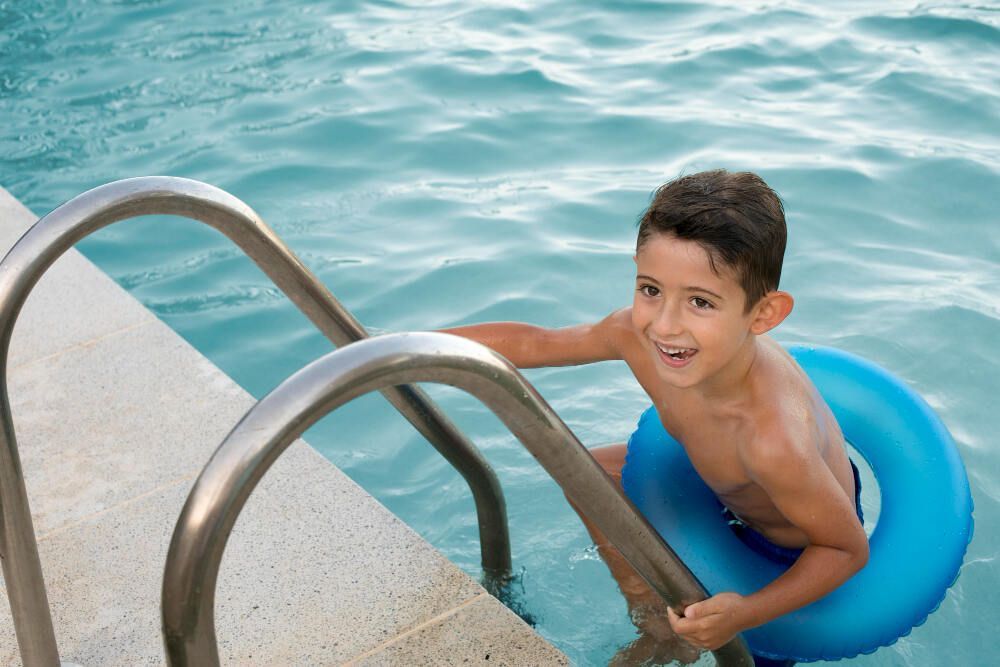
2. Supervision Strategies
Effective supervision is a crucial aspect of childproofing a swimming pool. While physical barriers and safety equipment are essential, they cannot replace the attentive eye of a responsible adult. Pool contractors often stress the importance of supervision strategies beyond watching children play in the water.
Elements of Active Supervision
Defining Active Supervision
Active supervision means being physically present, focused and engaged when children are in or around the pool. Pool contractors in Bethel, CT, emphasize that this is not passive; it involves constant vigilance, free from distractions like phones, books, or engaging in lengthy conversations.
Establishing Supervision Rules
It's important to have clear rules about who is responsible for watching the children. This responsibility should be assigned to a specific adult and not assumed to be a shared duty among several adults, as this can lead to lapses in supervision. Pool contractors suggest using a physical object like a 'supervisor’s hat' or a tag to designate the responsible adult.
Creating 'No Swim' Times
To enhance safety, pool contractors recommend establishing certain times when swimming is not allowed, especially when adequate supervision, such as during parties or gatherings, cannot be ensured.
Educating Guests about Pool Safety
Information about pool safety and supervision rules is crucial when hosting guests. Pool contractors advise that all guests, especially those supervising children, should be aware of the pool area's layout, depth markers, and any safety equipment available.
Use of Technology for Additional Safety
Search for “pool contractors near me” that use various technologies to enhance pool safety. Devices like pool alarms and surveillance cameras can serve as additional layers of security, alerting adults to unexpected pool access or providing visual coverage of the pool area.
3. Alarm Systems and Safety Equipment
Alarm systems and safety equipment are essential components of a comprehensive approach to pool safety. While physical barriers and supervision are critical, these technological solutions provide an additional layer of security. Pool contractors often emphasize the integration of alarm systems and essential safety equipment as part of their childproofing recommendations.
Pool Alarm Types
Surface Wave Detection Alarms
These alarms detect surface movements in the water, such as those caused by a child accidentally falling into the pool. Pool contractors recommend these alarms for their sensitivity and reliability. They are usually easy to install and can be a crucial alert system, especially when the pool is unsupervised.
Underwater Motion Alarms
Unlike surface wave detection, underwater motion alarms activate when a disturbance is beneath the surface. Pool contractors point out that these alarms are less likely to be triggered by wind or rain, making them a more stable option in certain environments.
Gate and Door Alarms
These are installed on gates or doors leading to the pool area. Pool contractors often stress the importance of these alarms, which alert homeowners whenever a child or an uninvited guest accesses the pool area.
Wearable Alarms
These devices are worn on children's wrists or as clips on their swimwear. Pool contractors note that wearable alarms are handy for constant monitoring, as they activate when submerged in water, providing immediate notification if a child falls into the pool.
4. Water Quality and Hygiene
Maintaining excellent water quality and hygiene in a swimming pool is essential for the health and comfort of the swimmers and a critical aspect of pool safety. Poor water quality can lead to various health issues, including skin irritation and more serious waterborne illnesses. Pool contractors often emphasize the importance of regular water maintenance and hygiene practices to ensure a safe and pleasant swimming experience.
Maintaining Water Quality
Regular Water Testing
Pool contractors stress the importance of regular water testing to monitor pH levels, chlorine concentration, and other chemical balances. This helps ensure the water is safe for swimming and prevents the growth of harmful bacteria and algae growth. Testing kits are readily available and easy to use, or pool owners can opt for professional testing services.
Balancing Chemicals
Based on the water testing results, adjusting the chemical levels is essential. Pool contractors advise on the correct amounts of chlorine, pH adjusters, and other chemicals needed to maintain a safe swimming environment. They also recommend automated chemical feeders for convenience and accuracy.
Dealing with Algae and Contaminants
Algae growth and other contaminants make the pool look uninviting and can be hazardous. Pool contractors recommend regular brushing and vacuuming of the pool, along with using algaecides and clarifiers as preventive measures.
Importance of Filtration
A well-functioning filtration system is vital for maintaining water clarity and quality. Look for “pool contractors near me” that guide homeowners on selecting the right filter for their pool size and usage and on proper maintenance and cleaning schedules.
Professional Maintenance Services
While DIY maintenance is possible, pool contractors like FJV Construction - Bethel CT often offer professional maintenance services. These services include more thorough checks and treatments, ensuring that the pool remains in optimal condition throughout the swimming season.
5. Emergency Preparedness
Emergency preparedness is a vital component of pool safety. Despite all preventive measures, emergencies can still occur, and being prepared can significantly affect the outcome. Pool contractors often stress the importance of having a well-thought-out emergency plan and the necessary skills and equipment to handle potential pool accidents.
Basic Lifesaving Skills
CPR Training for Adults and Older Children
Pool contractors strongly recommend that all adults and older children who frequently use the pool receive cardiopulmonary resuscitation (CPR) training. This training can be critical in saving a life in the event of drowning or other pool-related accidents. Many pool contractors can provide information on local CPR classes or organize training sessions.
Understanding Drowning Signs and Symptoms
Contrary to popular belief, drowning is often a quiet event. Pool contractors advise educating everyone about the real signs of drowning, which can include the inability to call out, gasping for air, and a body positioned vertically in the water without kicking.
Emergency Response Plan
Having a clear, concise emergency response plan is crucial. This plan should include immediate steps to take in case of an accident, emergency contact numbers, and the location of the nearest hospital. Pool contractors often suggest posting this plan visibly around the pool area.
Regular Emergency Drills
Just like fire drills, regular emergency drills can ensure everyone knows what to do in a pool emergency. Pool contractors recommend these drills to familiarize everyone with the emergency plan and reduce panic in real situations.
Swimming Skills and Water Safety Education
Basic swimming skills and understanding water safety are lifesaving. Pool contractors often encourage swimming lessons for all frequent pool users and discuss safe behavior in and around the pool.
6. Poolside Environment and Layout
Creating a safe and enjoyable poolside environment is crucial to maintaining the pool. The pool's layout and environment can significantly influence safety and accessibility. Pool contractors often stress the importance of designing an appealing poolside area that prioritizes safety.
Creating a Safe Poolside Area
Non-Slip Surfaces
One of the first recommendations from pool contractors is the installation of non-slip surfaces around the pool. Slippery pool decks are a common cause of accidents. Materials like textured concrete, pavers, and anti-slip tiles can greatly reduce the risk of slips and falls.
Adequate Poolside Lighting
Proper lighting is essential for safety, especially for pools used at night. Pool contractors advise installing sufficient lighting that illuminates the entire pool area, including walkways and steps, to ensure visibility and prevent accidents.
Furniture and Equipment Placement
Strategic placement of poolside furniture and equipment is key to preventing tripping hazards. Pool contractors recommend keeping the area around the pool clear of unnecessary obstacles and ensuring furniture is stable and appropriately sized.
Shade Areas
Pool contractors often suggest incorporating shade structures like pergolas, umbrellas, or canopies to protect swimmers from prolonged sun exposure. These areas provide a comfortable and safe space for relaxation and monitoring children.
Accessibility Features
For pools used by individuals with mobility challenges, pool contractors recommend including accessibility features such as handrails, ramps, or pool lifts. These features enhance safety and make the pool more inclusive.
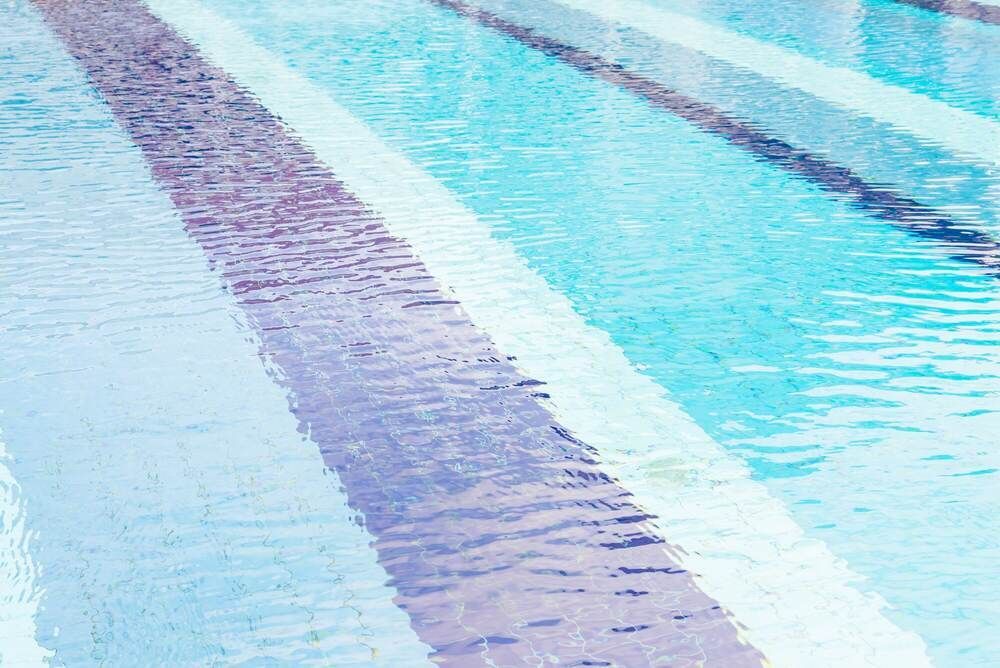
7. Regular Maintenance and Inspections
Regular maintenance and inspections ensure a swimming pool's long-term safety and functionality. Pool contractors often emphasize the importance of a consistent maintenance schedule and professional inspections to prevent minor issues from becoming major problems.
Routine Checkups by Professionals
Importance of Professional Inspections
Pool contractors underscore the importance of having professional inspections at regular intervals. These inspections can identify potential safety hazards, equipment malfunctions, or structural problems that may not be apparent to the untrained eye.
Frequency of Professional Inspections
Pool contractors typically recommend a thorough inspection at least once a year, preferably before the start of the swimming season. However, more frequent inspections may be necessary for pools with high usage or those in areas with extreme weather conditions.
Areas Covered in Professional Inspections
During a professional inspection, pool contractors examine several key areas. These include checking the integrity of the pool structure, inspecting filtration and pump systems, ensuring safety features like fencing and alarms are in working order, and assessing the condition of liners or tiles.
Detecting and Addressing Leaks
One of the primary focuses of professional inspections is detecting leaks, which can be a significant problem. Pool contractors use specialized equipment to find and repair leaks, which can prevent water waste and structural damage.
Updating Safety Features
As safety standards and technologies evolve, pool contractors can advise on upgrading existing safety features. This could include installing more efficient pool covers, updating fencing, or adding new alarms.
Frequently Asked Questions (FAQs)
How often should I have my pool water tested by pool contractors?
Pool contractors generally recommend having your pool water professionally tested at least once a month during the swimming season. This frequency ensures the chemical balance is consistently maintained for safe swimming conditions. In between these professional tests, homeowners should use home testing kits weekly to monitor water quality.
What signs do my pool need resurfacing, and can pool contractors assess this?
Signs that your pool may need resurfacing include noticeable cracks, rough textures, discoloration, or leaks. Pool contractors are skilled in assessing the condition of your pool's surface. They can provide expert advice on whether resurfacing is necessary and the best materials and methods for the job.
Can pool contractors help you choose energy-efficient pool equipment?
Yes, pool contractors can be very helpful in selecting energy-efficient pool equipment. They can advise on the latest technology in pumps, heaters, and filtration systems that reduce energy consumption and lower operating costs while maintaining a clean and safe pool environment.
How do pool contractors ensure that my pool complies with local safety regulations?
Pool contractors are knowledgeable about local safety regulations and building codes. They ensure compliance by designing pools and safety features according to these regulations, including specific requirements for fencing, alarms, and other safety equipment.
Are there eco-friendly options for pool maintenance recommended by pool contractors?
Pool contractors often recommend eco-friendly pool maintenance options, such as saltwater systems, solar heaters, and variable-speed pumps. These options reduce the environmental impact and can be more cost-effective in the long run. Additionally, non-toxic, biodegradable cleaning products are encouraged to maintain an eco-friendly pool environment.
Dive Into Pool Safety with FJV Construction - Bethel CT
If you're looking for professional guidance and top-notch services, look no further than
FJV Construction - Bethel, CT. As experienced pool contractors, we specialize in ensuring your pool's safety and maintenance meet the highest standards. Our team of professionals ensures your pool area is enjoyable and secure for everyone.
Contact us for a consultation and see how we can transform your pool area into a haven for family and friends to enjoy.
Our Info
Monday to Friday from 7 am to 6 pm
Saturdays from 8 am to 5 pm
We Accept Cash and Checks
LOCATION
We Cover 80 Miles around Bethel,
Danbury, and Brookfield
Bethel, Connecticut 06801
Danbury, Connecticut 06810
Brookfield, Connecticut 06804
Navigation
Copyright FJV Construction, All Rights Reserved
